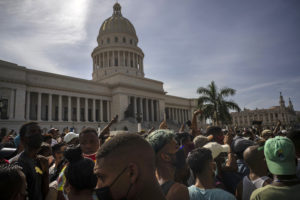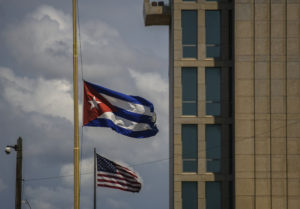By Clay Boggs and Geoff Thale
The U.S. State Department has criticized Cuba’s record on Lesbian, Gay, Bisexual, and Transgender (LGBT) rights and supported dissidents who raise LGBT issues. It has done so with good reason. In the 1960s, Cuba sent gay men to labor camps to be reformed, and discrimination against LGBT Cubans was endemic. But this is starting to change. Gay couples now appear on Cuban novelas, gay marriage has been debated in the National Assembly, and the municipality of Caibarié recently elected a transgender person to public office. A recent report by Freedom House concluded that "since 2008, Cuba has made important strides to redress discrimination against the lesbian, gay, bisexual, and transgender (LGBT) community."
These changes reflect a growing acceptance of sexual diversity and LGBT rights that is occurring worldwide. Not coincidentally, they are occurring at the same time that U.S. views on gay marriage are rapidly shifting. But they are also the result of Cubans who have courageously stood up for LGBT rights. And the Cuban who has done so most prominently—and, by many accounts, most effectively—is President Raul Castro’s daughter, Mariela Castro.
The response of U.S. policy makers to Ms. Castro and her activism has been decidedly mixed.
In 2012, Ms. Castro was granted a visa to visit the United States and attend the annual Latin American Studies Association conference. Josefina Vidal Ferriero, Director for North America at the Ministry of Foreign Relations, and Eusebio Leal, the Historian of the City of Havana, were granted visas at around the same time. Representatives Mario Diaz-Balart (R-FL), Ileana Ros-Lehtinen (R-FL), Albio Sires (D-NJ), and David Rivera (R-FL) condemned the granting of these visas, and Rep. Ros-Lehtinen called the three Cuban officials “oppressors of the Cuban people.”
But the most recent U.S. State Department Human Rights Report on Cuba put Ms. Castro’s work in a positive light. While noting ongoing and severe problems in a number of areas, including freedom of speech, freedom of association, political rights, arbitrary detention, and prison conditions, the report also noted some areas where the situation has improved, including political prisoners, freedom of religion, and freedom of travel. On LGBT rights, the report stated that “[t]here was no discrimination officially reported or permitted based on sexual orientation in employment, housing, statelessness, or access to education or health care.” But, while noting that “societal discrimination based on sexual orientation or gender identity persisted,” the report highlighted the role of Ms. Castro in opposing discrimination: “Mariela Castro, President Castro’s daughter, headed the national Center for Sexual Education and continued to be outspoken in promoting the rights of lesbian, gay, bisexual, and transgender (LGBT) persons. In May the government sponsored a march and an extensive program of events to commemorate the International Day Against Homophobia.” This report would seem to be a strong rebuttal of assertions by members of Congress that Ms. Castro is an “oppressor of the Cuban people.”
On April 25, press reports indicated that Ms. Castro had been given to a visa to attend meetings at the United Nations, but that Ms. Castro would be prohibited from traveling more than 25 miles without receiving permission. (This is the same restriction that is placed on Cuban diplomats at the United Nations). Hence, Ms. Castro will probably be unable to travel to Philadelphia to receive an award at the Equality Forum’s Global LGBT Summit on May 4.* The Equality Forum is a leading organization in the LGBT community, and the Global LGBT Summit is focusing this year on LGBT rights in Cuba. Prohibiting Ms. Castro from attending the forum and receiving her award is a missed opportunity, and it undercuts the U.S. government’s efforts to support LGBT rights in Cuba.
The limited visa granted to Ms. Castro is indicative of the politicization of all things Cuba, including visa decisions. But it is also indicative of the contradictions and limitations inherent in the United States’ approach to promoting democracy and human rights in Cuba, which in recent years has grown to include LGBT rights.
The State Department’s Human Rights Report recognizes that Ms. Castro is a leading proponent of LGBT rights in Cuba, but because the U.S. approach to promoting human rights and democracy in Cuba has focused almost entirely on supporting opponents of the Cuban regime, this recognition is not reflected in the government’s actions. It is probably true that if Ms. Castro opposed the Cuban government, the State Department would allow her to travel to Philadelphia. But, because she does not meet certain political criteria, she is unable attend a public event in the United States where she will be honored for her contributions to international LGBT rights.
This hurts the United States’ credibility on LGBT issues, and it calls into question the U.S. commitment to defending LGBT rights abroad.
U.S. policy should reflect that fact that there are many people in Cuba, whether in government, academia, or the religious community, who advocate for greater freedoms without opposing the regime. If U.S. policymakers are serious about helping to foster change in Cuba, they need to broaden their focus and do more to engage with people like Mariela Castro.
* UPDATE: We are pleased to announce that on April 30, the Associated Press reported that the U.S. State Department reversed their decision and will allow Ms. Castro to receive her award in Philadelphia.


